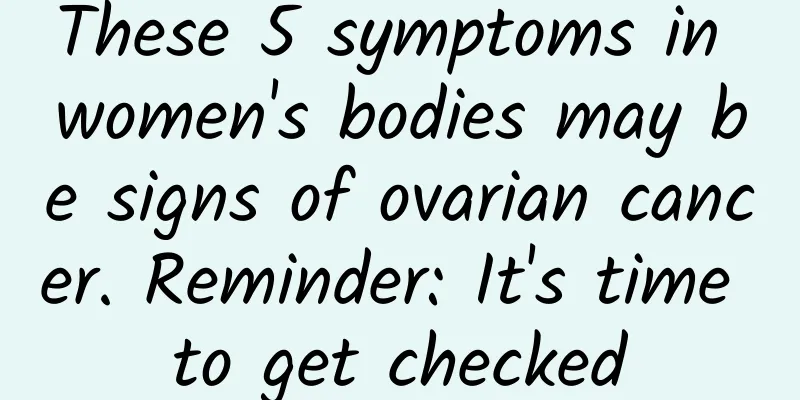These 5 symptoms in women's bodies may be signs of ovarian cancer. Reminder: It's time to get checked

|
Xiao Li recently felt something was wrong with her body. She felt bloated from time to time and thought she had eaten something bad or had not rested enough due to work fatigue. It was not until her best friend reminded her that it was not just a matter of fatigue, but that her body was ringing the alarm bell that she realized that it might be time to see a doctor. Today, let me tell you about ovarian cancer, one of the most common cancers in women! 1. These five factors may be the causes of ovarian cancer! There may be many reasons for the increase in ovarian cancer rates. Here are some of the main ones: Genetic factors: Ovarian cancer has a certain family genetic tendency. Family members with a history of ovarian cancer have a relatively higher risk of developing the disease. Endocrine factors: Early menarche, late menopause, infertility, and late age of first full-term birth may be related to the occurrence of ovarian cancer. In addition, factors such as smoking, history of diabetes, and obesity can also increase the incidence of tumors. Lifestyle habits: Lack of exercise, high-fat diet, mental stress, high pressure and other lifestyle habits may lead to a decline in the body's immune function, thereby increasing the risk of ovarian cancer. Long-term consumption of smoked and pickled foods is also closely related to the occurrence of ovarian cancer. Obesity: Obesity is an independent risk factor for ovarian cancer because it may lead to metabolic abnormalities and cause hyperinsulinemia, thereby increasing the incidence of ovarian cancer. Psychological factors: Women who are under long-term psychological stress, excessive depression, and tension may have decreased physical functions and may have an increased risk of ovarian cancer. In order to prevent and reduce the incidence of ovarian cancer, women are advised to undergo regular physical examinations, especially those with a family history of the disease, who should pay attention to early screening and treatment. At the same time, maintaining healthy eating habits, appropriate physical activity, avoiding smoking and excessive drinking, and controlling weight are all important preventive measures. 2. Don’t ignore these five signals from your body! First, let’s talk about bloating. It's not the kind of bloating that comes from eating too much, but the kind that comes for no reason, like there's a little balloon in your stomach that's being inflated. If this feeling is like there's a naughty elf dancing inside you and it won't go away, be careful. Small tumors of ovarian cancer may cause trouble in your stomach and disrupt your gastrointestinal function. At this time, don't simply think that you have eaten something wrong. You should quickly see a doctor to find out what's going on. Next is the abdominal mass. Imagine that your lower abdomen suddenly bulges out, as if there is a small stone rolling around inside. This is not a six-pack abs from fitness training, but an SOS signal that ovarian cancer may be sending you. If you feel something hard in your abdomen and it hurts to touch, you should take it more seriously. When it comes to abnormal vaginal bleeding, it's like a red alert for your body. It is not a good thing to have blood streaks when you are not menstruating, or to have repeat visits after your period is over. Endocrine disorders and endometrial damage may be the cause of ovarian cancer. Don't be shy at this time, you should go to the hospital for a check-up immediately. Do you think back pain is caused by sitting in the office for a long time? Wrong! Ovarian cancer may also wreak havoc in the pelvic cavity. Once the tumor begins to attack the peripheral nerve plexus, the soreness you feel can be more than just sciatica. If your lower back pain feels like it's being pulled by an invisible string, it's time to call your doctor. Finally, fatigue. This is not just simple tiredness, but cancer is quietly sucking away your energy. I feel weak all over, just like I am exhausted after running a marathon, and even resting can't relieve my fatigue. This is not because I am lazy, but my body is really calling for help. Sisters, the early symptoms of ovarian cancer may be subtle, but they should never be taken lightly. Especially when these symptoms persist or even become more severe, that is the body shouting: "I need help!" Remember, early detection and early treatment, ovarian cancer is not an invincible enemy. Ovarian cancer is a relatively hidden malignant tumor. Because its early symptoms are not obvious, prevention is particularly important. 3. These tips will help you prevent ovarian cancer! Here are some preventive measures you can take in your daily life: Balanced diet: Reduce the intake of high-fat, high-calorie foods, such as fatty meat and cream products, and increase the intake of vegetables and fruits to supplement vitamins and fiber. Proper calcium supplementation can be achieved by eating calcium-rich foods such as milk, soy products, shrimp, seafood, etc. Regular physical examinations: Since the early symptoms of ovarian cancer are not obvious, regular physical examinations are very important. It is recommended that women over 50 and women with a family history of ovarian cancer undergo relevant examinations every year to detect the disease in time. Use hormones with caution: Long-term use of hormones to regulate menstruation may increase the risk of ovarian cancer. Before using any product containing hormones, the potential risks should be carefully considered. Exercise more: Exercising moderately every week can reduce the risk of ovarian cancer. Exercise can help lose weight, strengthen your body and improve your resistance, thereby helping to prevent the occurrence of ovarian cancer. Avoid smoking: Smoking increases your risk of several cancers, including ovarian cancer. Quitting smoking can significantly reduce this risk. Adjust the dietary structure: reduce the intake of high-fat and high-cholesterol foods, consume more protein and vitamins, eat more green vegetables and fresh fruits, and maintain normal nutritional metabolism of the human body. Bathing in the sun: Studies have shown that women living in lower latitudes have a lower risk of ovarian cancer than those living in higher latitudes. This may be because the former have longer exposure to sunlight and higher intake of vitamin D, which is better for cancer prevention than the latter. Have regular physical examinations: Female friends should pay attention to their physical condition at all times and have regular physical examinations so as to detect physical abnormalities in time and receive timely treatment. Through the above measures, the risk of ovarian cancer can be reduced to a certain extent. However, it should be noted that despite taking preventive measures, ovarian cancer may still occur, so regular physical examinations and timely treatment are still crucial. Take care of yourself, start with regular physical examinations, let us be healthy experts together and keep diseases out! If you have any of the above symptoms, go to the hospital immediately, don't let small problems become big troubles. Come on, our bodies, we are the masters! If you want to know more about gynecological knowledge, remember to like and follow us! |
Recommend
Get rid of arm fat with this trick! Lazy beauty exercise to increase muscle firmness
When the weather is hot, you want to wear a well-...
Chewing can control your waistline! 9 weight loss tips revealed
If you think that the digestive tract is simply a...
What medicine should I take to treat uterine fibroids? How long does it take for uterine fibroids to disappear?
Uterine fibroids refer to lumps formed by the pro...
Four early symptoms of cervical erosion
What are the early symptoms of cervical erosion? ...
The most valuable auxiliary examination for threatened abortion
Every pregnant mother wants to give birth to a he...
How to treat irregular menstruation?
Irregular menstruation seriously affects the dail...
Does left lateral adnexitis affect pregnancy?
Left-sided adnexitis may affect pregnancy and nee...
Can cervical warts be cured? Will there be any sequelae?
Can cervical warts be cured? Will there be any se...
It’s hard not to be fat! 50% of people spend too much money on snacks during the Chinese New Year
Stop hoarding New Year snacks! Before the Chinese...
What foods are good for the body if you are born without vagina?
What foods are good for the body for people with ...
Patients with irregular menstruation may also experience facial color changes
Patients with irregular menstruation may also hav...
People should always pay attention to the causes of vaginitis
At present, the incidence of vaginitis is getting...
What diseases can thick endometrium cause?
A thick uterine lining may cause abnormal uterine...
What should you pay attention to after a miscarriage? See what the doctor says
Precautions after miscarriage include: observing ...
Can I get pregnant if I have vaginitis?
Can you get pregnant if you have vaginitis? When ...









